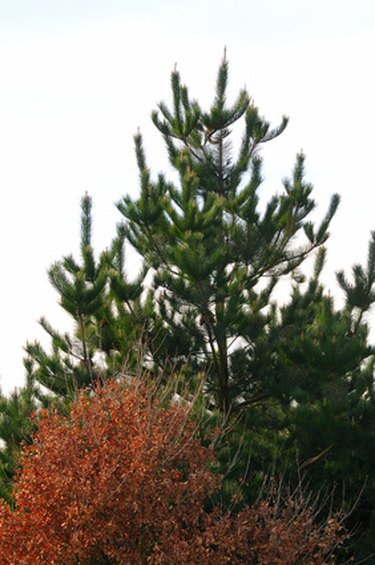
Illinois tree-trimming laws are designed to protect tree owners and those who are bothered by their neighbor's trees, especially when the branches begin to encroach on their property. Laws were passed in 2001 that alter the ways in which contractors can trim trees, while other laws that have existed for years continue to protect against unlawful tree trimming. Those who illegally trim a tree in Illinois will be fined.
The Law
Video of the Day
Gov. George Ryan of Illinois signed into law House Bill 1776, now referred to as Public Act 92-0214, on Aug 2, 2001. Under the guidelines of this law, property owners have to receive a 21-day advance notification by contractors before any tree trimming or cutting can take place. However, contractors cannot give more than a 90-day advance warning in order to prevent residents from forgetting that the tree trimming is occurring on a certain day. Advance notification is not required in Illinois if tree trimming is needed in order to restore a specific service. For example, if a tree is tampering with a phone line, a contractor has the right to trim the tree without the need of giving notice to the residents in the neighborhood.
Video of the Day
Property Issues
Tree-trimming laws in Illinois help determine the legal rights of neighbors who have tree-related disputes. For example, under Illinois law, if the trunk of a tree rests on the property line that separates two homes, both homeowners have a legal right to trim or cut the tree but must first get permission from the other neighbor in order to do so. If the trunk of the tree rests solely on one neighbor's land, then only he has the right to cut or trim it unless the branches of the tree begin to encroach onto his neighbor's property. Under these circumstances, the non-tree-owning neighbor has the right to trim the branches that have grown onto her property.
Penalties
Under the guidelines of the Illinois State Code Section 2, residents are not allowed to trim or cut another resident's tree without first obtaining the legal right to do so. Those found in violation of this law will be required to pay the owner of the tree three times the overall worth of the tree before it was cut down. The worth of the tree will be determined by the Director of the Department of Natural Resources in Illinois. The department will have a maximum of 30 days to evaluate the worth of the tree and report such conclusions to the Illinois courts. Those who do not pay the fine ordered by the court will be found in contempt of the court.